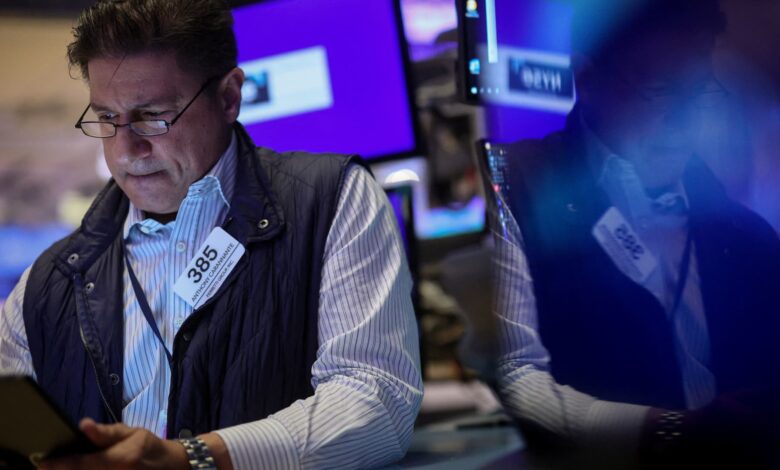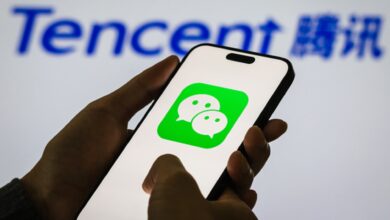Apple shares pop, Musk drops OpenAI lawsuit

Traders work on the floor at the New York Stock Exchange (NYSE) in New York City, U.S., Feb. 23, 2024.
Brendan McDermid | Reuters
This report is from today’s CNBC Daily Open, our international markets newsletter. CNBC Daily Open brings investors up to speed on everything they need to know, no matter where they are. Like what you see? You can subscribe here.
What you need to know today
More records smashed
The S&P 500 and Nasdaq Composite closed at record highs, driven by investors apparently shifting from Nvidia to Apple shares, propelling the iPhone maker to a new peak. Meanwhile, the Dow Jones Industrial Average fell by 120 points ahead of key inflation data and the conclusion of the Federal Reserve’s meeting on Wednesday. The 10-year Treasury yield dipped in anticipation of the Fed’s economic projections. U.S. oil prices remained steady as OPEC maintained its demand and economic growth forecasts.
Apple pops
Apple’s shares rose to a record high a day after it announced its push into artificial intelligence. Siri will get an upgrade with Apple Intelligence and the company will partner with OpenAI, giving users access to ChatGPT. Morgan Stanley said Apple’s AI features strongly position the company with “the most differentiated consumer digital agent.” And the features will drive consumers to upgrade their iPhones, which should “accelerate device replacement cycles.”
Musk drops OpenAI suit
Elon Musk dropped his lawsuit against OpenAI, CEO Sam Altman and President Greg Brockman, which alleged breach of contract and fiduciary duty. The lawsuit centered scheduled for a hearing in San Francisco, centered on Musk’s claim that OpenAI deviated from its original non-profit mission to pursue profits under Microsoft’s control. Legal experts had questioned the case’s foundation, as the underlying contract was not a formal written agreement.
GM trim EV sales
General Motors trimmed its electric vehicles sales and production forecast as demand softened for the industry as a whole. GM Chief Financial Officer Paul Jacobson said the company now expects production of 200,000 to 250,000 EVs this year, down from a previously announced range of 200,000 to 300,000. The company’s shares rose 1.3% after the automaker announced plans to buy back $6 billion of stock.
Autos drive Hong Kong lower
Asian markets were mixed as investors awaited the Fed’s interest rate decision and U.S. inflation data. Hong Kong’s Hang Seng dropped 1.45%, led by the auto sector, ahead of a decision from the European Union on electric vehicle tariffs. Mainland China’s CSI 300 index slipped 0.2% as inflation rose for the fourth straight month. The Taiwan Weighted index hit an all-time high as tech heavyweights Taiwan Semiconductor Manufacturing Corp and Hon Hai Precision Industry — also known as Foxconn — jumped over 3% each. While South Korea’s Kospi rose 0.44%, both Japan’s Nikkei 225 and Australia’s S&P/ASX 200 traded lower.
[PRO] Lingering skepticism
Apple’s stock performance has been outpaced by other major tech companies this year, with some analysts attributing this lag to the company’s lack of a publicly articulated AI strategy. While many analysts expect Apple’s new AI offering to push consumers to buy new iPhones, not all analysts are convinced.
The bottom line
The Federal Reserve faces a fresh inflation headache as Goldman Sachs forecasts Brent crude oil prices could soar to $86 a barrel in the third quarter. The investment bank cites surging summer demand and a substantial supply deficit, which could drive up gasoline costs and further complicate the Fed’s policy decisions during its upcoming meeting.
While former World Bank President David Malpass criticized the Fed’s past mistakes, he also took aim at the Biden administration’s fiscal policies on CNBC’s “Squawk Box,” saying, “The Fed made a big mistake at being at zero for a long time. It takes years to straighten out that problem. Real interest rates are high enough, we need to recognize inflation is coming from what the rest of the government is doing, in terms of regulation. We need to recognize that the government drained the SPR, Strategic Petroleum Reserve at the wrong time.”
Malpass was referring to the administration’s release of 1 million barrels of gasoline from reserves ahead of the July 4 holiday.
He also highlighted the U.S. government’s excessive spending, stating, “The U.S. government is sucking up money from around the world to spend on things it wants… That causes businesses to invest less and we end up with slow growth out into the future and big deficits.”
Despite the upcoming release of consumer price inflation data before the bell, former Atlanta Fed President Dennis Lockhart told “Squawk Box” that it’s unlikely to significantly impact the outcome of the Fed’s meeting. He said, “In my experience when people are sort of locked into their positions. It would take a pretty startling CPI report to change the basic momentum of the meeting… On balance, this is going to be a boring meeting.”
Boring it may be but it is inescapable that Wall Street will be scrutinizing the Fed’s decision and the guidance it offers to figure out when it could consider cutting rates. Right now, the CME’s FedWatch Tool suggests that there is a 50/50 chance of a rate cut in September and a 66% chance in November.
For more, CNBC’s Jeff Cox explains there could be a huge impact from the consumer price index and the Fed meeting.
— CNBC’s Lim Hui Jie, Jeff Cox, Lisa Kailai Han, Alex Harring, Spencer Kimball, Hayden Field, Samantha Subin, Ashley Capoot and Michael Wayland contributed to this report.






